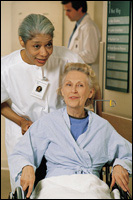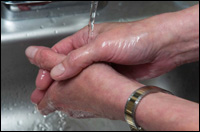Prevent Clostridium difficile Infection
 If you visit friends or family in a nursing home, take steps to prevent Clostridium difficile.
If you visit friends or family in a nursing home, take steps to prevent Clostridium difficile.
 Are you planning to visit your loved one in a nursing home? With National Nursing Home Week (May 10-16, 2009) upon us, many people may be visiting their loved ones soon or speaking with them on the telephone. What many people may not know is that their loved ones are at risk for Clostridium difficile infection (CDI, also known as C. diff), particularly if they are elderly and taking antibiotics for another infection. CDI is an infection that causes diarrhea and more serious intestinal conditions and it can even be fatal. It is important to be aware of CDI and to tell your loved ones about it, because CDI can be prevented.
Are you planning to visit your loved one in a nursing home? With National Nursing Home Week (May 10-16, 2009) upon us, many people may be visiting their loved ones soon or speaking with them on the telephone. What many people may not know is that their loved ones are at risk for Clostridium difficile infection (CDI, also known as C. diff), particularly if they are elderly and taking antibiotics for another infection. CDI is an infection that causes diarrhea and more serious intestinal conditions and it can even be fatal. It is important to be aware of CDI and to tell your loved ones about it, because CDI can be prevented.
What is CDI?
CDI is a bacterial infection that causes diarrhea and more serious intestinal conditions, such as colitis. People who get CDI are usually elderly and taking antibiotics for another infection. They also are usually patients in hospitals or residents in nursing homes.
Clostridium difficile bacteria are found in the feces of an infected person. Other people can become infected if they touch items or surfaces that are contaminated with the bacteria and then touch their mouth.
CDI can be treated by a healthcare provider with a 10-day course of antibiotics that specifically treats CDI. More serious cases of
CDI may require hospitalization or surgery.
 How Can CDI Be Prevented?
How Can CDI Be Prevented?
CDI can be prevented by washing your hands with soap and warm water. Patients in hospitals and residents in nursing homes should wash their hands very often and try to avoid touching surfaces, especially in bathrooms. Patients and their families also should remind healthcare workers to clean their hands before and after caring for a patient or resident.
If you are visiting your loved one in a hospital or nursing home, please be sure to wash your hands too to help prevent the spread of CDI and other infectious diseases.
More Information
- CDC Division of Healthcare Quality Promotion
- Prevention & Control of Clostridium difficile Infections
- Frequently Asked Questions about C. difficile (
 1MB, 2 pages)
1MB, 2 pages) - Hand Hygiene Saves Lives (
 in English and in Spanish)
in English and in Spanish)
Current Features
Need info on a
different topic? See


